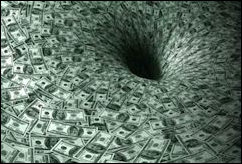The latest projections from the Congressional Budget Office (CBO) indicate that, given continuation of current levels of taxation and programmatic spending, the U.S. budget deficit will be running at $2.3 trillion a year by 2033, driven in large part by a $1 trillion-a-year increase in interest payments on the national debt to $1.4 trillion a year.
As it happens, 2033 is just a couple of years away from 2035, the year that Social Security’s Old Age and Survivors Insurance trust fund is scheduled to run out of money and the payout will be limited to what the program brings in from payroll taxes, limiting the payout to 77% of what was promised.
What’s the most likely scenario in the early 2030s? Congress will borrow to sustain the full Social Security payments, adding to the deficit and accelerating growth in the national debt. This year the deficit will be about 4.3% of gross domestic product. By 2033, it will be 7.3% — and that’s before a Social Security bailout. Interest on the national debt, which cannot be cut without triggering a default, will amount to 3.6% of the entire economy.
Absolutely no one in Washington, D.C., other than a few fiscal conservatives dismissed by the political establishment as cranks, is remotely serious about taming spending. The debate is about how much we add to domestic spending programs, thus accelerating our ultimate fiscal demise. Even if we had the political will to either slash spending or raise taxes, the deficit amounts to 5.4% of the economy this year. Closing that gap would plunge the country into a recession or, if stretched over several years, prolonged stagnation. Which means the politicians will never allow it to happen.
At some point, investors will get nervous and demand a premium to offset the increased risk of either default or inflation. Interest rates will surge, and the federal fisc will enter a slow-motion death spiral.
Virginia, like other states, is required by its state constitution to balance its budget. We’ll never face the catastrophic fiscal crunch that the federal government will. But the economic outlook will be ugly. Among the 50 states we are uniquely dependent upon federal spending — especially that which is termed “discretionary” spending… spending that doesn’t go to maintain the debt or pay for mandated transfer payments. You know, optional stuff like the military and salaries for federal employees. Thus, when federal spending contracts, Virginia will be the first to feel the effects. When our economy contracts, so will revenues. Thanks to our balanced budget mandate, that will compel tax hikes or spending cuts.
So, what can we do to prevent national fiscal catastrophe from turning into a local fiscal catastrophe?
First, maintain Virginia’s AAA bond rating. The rating won’t stay AAA in a Boomergeddon meltdown scenario — I doubt it will for any state — but you’d rather get sucked into the fiscal cyclone with a AAA rating than a BBB rating. Protecting our investment grade rating at least will allow us to continue borrowing when the time comes. Chicago? Not a chance. No one will lend it a dime.
Second, go for a AAA+ (even though that’s not a real rating). Pay off our unfunded pension liabilities which, despite pension reforms and a booming stock market through last year, amount to $34 billion. By the way, limit the power of public employee unions in their collective bargaining, now legal in Virginia, to extract bigger payouts from state and local government.
Third, maintain infrastructure in tip-top condition. The easiest form of stealth deficit spending is to fall behind in maintenance and short-change financial reserves. When Boomergeddon hits, you want your infrastructure in pristine condition, so when you do start falling behind, as you inevitably will, your roads, bridges, sewage-treatment plants, and all the rest won’t decline to Third World standards.
Finally, audit independent authorities, whose finances are largely out of the public eye, to see which ones are sound and which are marginal. The Virginia Ports Authority, the Metropolitan Washington Airports Authority, and other quasi-independent enterprises support critical infrastructure that Virginia cannot do without. Like the Commonwealth as a whole, they need to shore up their finances so they can continue to operate in Great Depression-style economic conditions.
I know, I know, Boomergeddon still seems theoretical and far off. But Virginia is spending billions of dollars to restructure its energy economy to do our insignificant part to head off a feared global climate disaster 80 years from now… which is even more theoretical and more far off. Remember, climatistas, there’s not much hope of completing the transition to a zero-carbon economy by 2050 if our economy collapses in 2035.
We freak out whenever the temperature hits a new high. Heed the fiscal signs. We should be equally freaked out when deficits and debt hit new highs.


Leave a Reply
You must be logged in to post a comment.